
"Me and Bobby McGee" is a song written by American singer-songwriter Kris Kristofferson and originally performed by Roger Miller. Fred Foster shares the writing credit, as Kristofferson wrote the song based on a suggestion from Foster. A posthumously released version by Janis Joplin topped the Billboard Hot 100 in 1971, making the song the second posthumously released No. 1 single in U.S. chart history after "(Sittin' On) The Dock of the Bay" by Otis Redding. Gordon Lightfoot released a version that reached number 1 on the Canadian country charts in 1970. Jerry Lee Lewis released a version that was number 1 on the country charts in December 1971/January 1972 as the "B" side of "Would You Take Another Chance on Me". Billboard ranked Joplin's version as the No. 11 song for 1971.

"Ain't Nothing Like the Real Thing" is a 1968 single released by American R&B/soul duo Marvin Gaye and Tammi Terrell, on the Tamla label in 1968. The B-side of the single is "Little Ole Boy, Little Ole Girl" from the duo's United LP. The first release off the duo's second album: You're All I Need, the song—written and produced by regular Gaye/Terrell collaborators Ashford & Simpson—became a hit within weeks of release eventually peaking at number eight on the US Billboard Hot 100 and number one on the Hot Soul Singles chart, the first of the duo's two number-one R&B hits. In the UK "Ain't Nothing Like the Real Thing" reached number 34.

"Ben" is a song written by Don Black and Walter Scharf for the 1972 film of the same name. It was performed by Lee Montgomery in the film and by Michael Jackson over the closing credits. Jackson's single, recorded for the Motown label in 1972, spent one week at the top of the Billboard Hot 100, making it Jackson's first number one single in the US as a solo artist. Billboard ranked it as the number 20 song for 1972. It also reached number 1 on the ARIA Charts, spending eight weeks at the top spot. The song also later reached a peak of number 7 on the UK Singles Chart. In 2004, the song appeared in The Ultimate Collection.
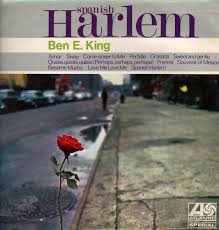
"Spanish Harlem" is a song recorded by Ben E. King in 1960 for Atco Records. It was written by Jerry Leiber and Phil Spector and produced by Jerry Leiber and Mike Stoller. "Spanish Harlem" was King's first hit away from The Drifters, peaking at number 15 on Billboard's rhythm and blues and number 10 in pop music chart.
"Too Young" is a popular song, with music written by Sidney Lippman and lyrics by Sylvia Dee. A recording of the song was released by Nat King Cole in 1951, which reached No. 1 in the United States and became the best-selling song of the year. The song was an early attempt by music labels to appeal to the younger demographics and its success later led to a boom in music that catered to the young. Another successful version was released by Donny Osmond in 1972.
"Why" is a hit song recorded by Frankie Avalon in 1959. It reached No. 1 on the U.S. Billboard Hot 100 chart published on the week of December 28, 1959. It was Avalon's second and final No. 1 hit.
"Young Love" is a popular song, written by Ric Cartey and Carole Joyner, and published in 1956. The original version was recorded by Ric Cartey with the Jiva-Tones on November 24, 1956. Joyner was a high school student when she co-wrote the song with Cartey, her boyfriend at the time. It was released in 1956 by Stars Records as catalog number 539 and one month later by RCA Records as catalog number 47-6751. Cartey's version never charted.

"Will It Go Round in Circles" is a song by American soul musician Billy Preston from his 1972 album Music Is My Life. It was written by Preston and Bruce Fisher and released as a single in March 1973. The record topped the Billboard Hot 100 and sold over a million copies. This was the first of two number one hits for Preston as a solo performer, the other being "Nothing from Nothing", although he is also credited on the Beatles' 1969 hit "Get Back".
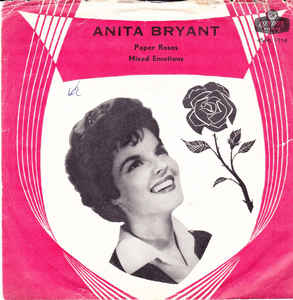
"Paper Roses" is a popular song written and composed by Fred Spielman and Janice Torre. It first was a top five hit in 1960 for Anita Bryant. Marie Osmond recorded it in 1973 and took her version to number one on the US country chart.
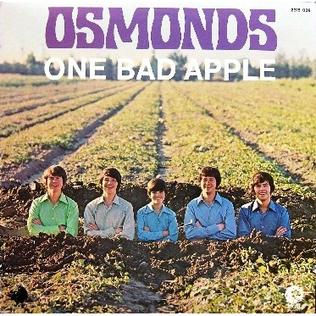
"One Bad Apple" is a song by the Osmonds, released as a single on November 14, 1970. It debuted on the Billboard Hot 100 on January 2, 1971. It hit the top of the chart on February 13, 1971 and stayed there for five weeks. It also reached No. 6 on the R&B chart. Billboard ranked it as the No. 4 song for 1971. Both "One Bad Apple" and the Donny Osmond-credited single "Sweet and Innocent" are on the 1970 album Osmonds. It was certified Gold by the RIAA on February 4, 1971.
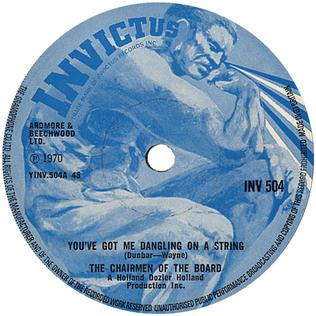
"(You've Got Me) Dangling on a String" is a 1970 soul music song by the Chairmen of the Board. The single reached No. 38 on the US Billboard Hot 100, No. 19 on the US Billboard R&B chart, and No. 5 on the UK Singles Chart. Ronald Dunbar and Edythe Wayne wrote the song.

"My Melody of Love" is the title of a popular song from 1974 by the American singer Bobby Vinton. Vinton adapted his song from a German schlager song composed by Henry Mayer, and it appears on Vinton's album Melodies of Love. The song was also recorded by Spanish pop singer Karina as "Palabras de Cristal".

"Hey Girl" is a song written and composed by Gerry Goffin and Carole King. It first became a popular Top ten hit on the Billboard Hot 100 in August 1963 when recorded by Freddie Scott. Donny Osmond took the song back to the Billboard top ten chart with his cover in 1971. Billy Joel recorded a version of the song for his 1997 album Greatest Hits Volume III.

"Sweet and Innocent" is a song written by Rick Hall and Billy Sherrill, first recorded by Roy Orbison in 1958. It was released as the B-side to the single, "Seems to Me".
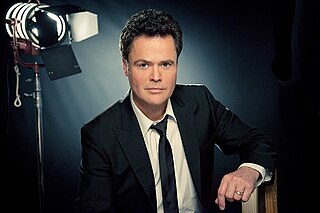
The discography of American pop singer Donny Osmond contains 18 studio albums, nine compilation albums, one live album, four video albums, three extended plays, four music videos, 25 singles, and eight additional appearances. After several years collaborating with his siblings' band, The Osmonds, he embarked on a solo career in 1971. His debut single, "Sweet and Innocent," reached number seven on the Billboard Hot 100 and made him a teen pop star. Its follow-up entitled "Go Away Little Girl" topped the same chart in 1971. Also in 1971 his debut studio album was released called The Donny Osmond Album. It peaked at number 13 on the Billboard 200 all-genre chart. His third studio release, Portrait of Donny, reached number six on the Billboard 200 and is his highest-charting album to date. Its two singles became top ten hits on the pop chart: "Hey Girl" and "Puppy Love." He released his fourth studio effort in 1972, Too Young. The record peaked at number 11 on the Billboard 200. It spawned the top 20 pop hits: the title track and "Why." In 1973, Alone Together marked his fifth studio album release and peaked at number 26 in the United States. It spawned his cover of "The Twelfth of Never," which reached number eight on the Hot 100. By the mid-1970s, Osmond reached adulthood and his career began to decline despite collaborations with his sister, Marie Osmond. In 1976, he recorded an album of disco, which only reached number 145 on the Billboard 200.

"Morning Side of the Mountain" is a song written by Larry Stock and Dick Manning and first recorded in 1951 by Tommy Edwards. It settled at #24 on the pop chart. Edwards re-recorded it in 1959, reaching #27 on the Billboard Hot 100. The re-release was featured as the B-side of Edwards' other hit, a cover of Johnnie Ray's 1952 success, "Please Mr. Sun."
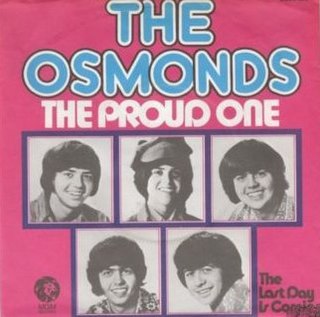
"The Proud One" is a 1966 single written by Bob Gaudio and Bob Crewe and originally performed by Frankie Valli as part of his debut solo album, The 4 Seasons Present Frankie Valli Solo. Valli's version, which featured the Seasons on instrumental backing but not vocals, peaked at #68 in the U.S. and #64 in Canada. Billboard claimed that "the electric sound of Valli is used to perfection in this powerful ballad, stating that the "easy-go dance beat [is] effective." Cash Box said that it is a "powerhouse" and that "the Valli sound holds the moving, teen-oriented tale of love together and the sweeping arrangement adds a must spin again quality to it."

"Never Ending Song of Love" is a song written by Delaney Bramlett, and, according to some sources, by his wife Bonnie Bramlett. It was originally recorded with their band, Delaney & Bonnie & Friends, in 1971 on the album Motel Shot. Released as a single by Atco Records the same year, "Never Ending Song of Love" became Delaney & Bonnie's greatest hit on the pop charts, reaching a peak of No. 13 on the Billboard Hot 100 and No. 8 on Easy Listening. It reached No. 16 in Australia.

"Don't Throw It All Away" is a song written by British musician Gary Benson and first released by the Shadows on their 1975 album Specs Appeal. Benson released his version as a single later the same year, which reached number 20 on the UK Singles Chart in the fall of 1975.

The discography of American pop duo Donny and Marie Osmond contains seven studio albums, four compilation albums, one soundtrack album, one live album and 12 singles. Both siblings had previously had successful solo music careers before first collaborating in 1974; Donny was also a member of his brothers' band, The Osmonds. Their first single, "I'm Leaving It Up to You," reached number four on the Billboard Hot 100. Their corresponding debut album of the same name peaked at number 35 on the Billboard 200 chart in November 1974. The release certified gold in the United States for sales beyond 500,000 copies. Together, the duo had two more hits that reached both the top ten and 20 of the Hot 100: "Deep Purple" and "Morning Side of the Mountain."


















